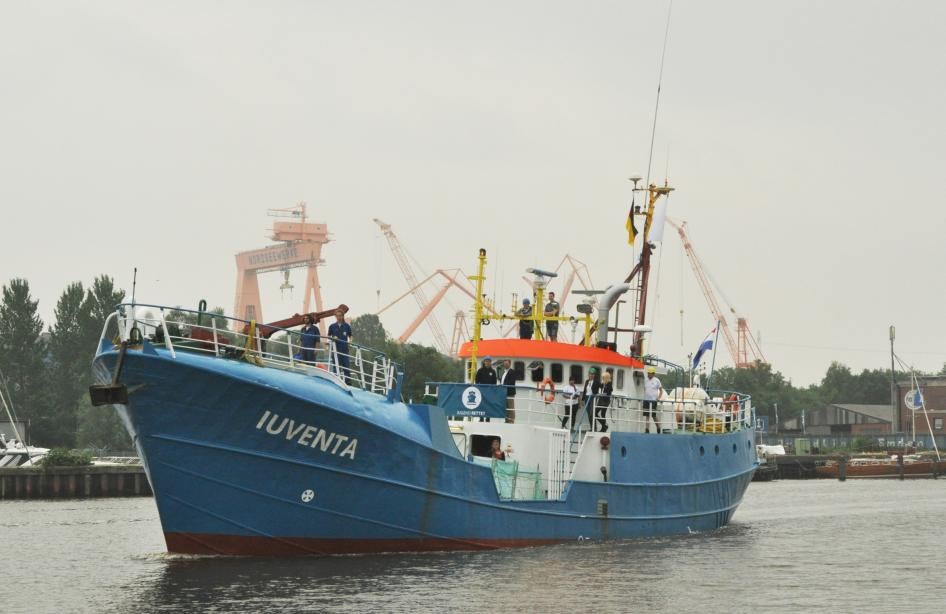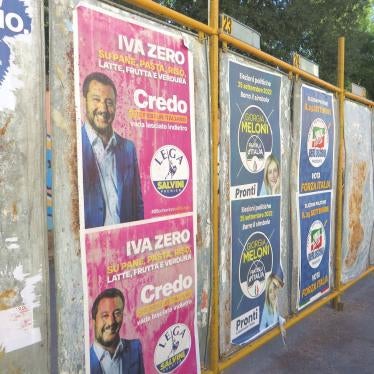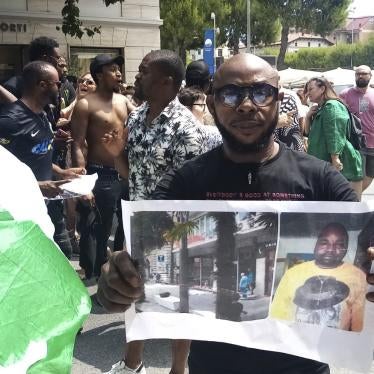Italy's new government has launched a fresh assault on non-governmental rescue groups that save lives.
While the rhetoric is sharper and some tactics are new, successive Italian governments have tried to block groups who rescue migrants at sea, including with criminal charges.
Judges have thrown out all charges in all cases except one: an ongoing trial of members of the Iuventa crew and two other rescue groups. The case, currently listed for a further preliminary hearing on 19 December, shows the lengths to which Italian authorities are willing to go to stop rescue groups from saving lives at sea, with worrying implications for the rule of law.
Since 2017, successive Italian governments have repeatedly condemned rescue groups, imposed a controversial NGO "Code of Conduct," delayed and refused to let survivors on these ships land, and attempted to prosecute such groups on spurious charges of abetting "illegal migration."
Within days of coming to power, prime minister Giorgia Meloni's government tried to get away with the "selective disembarkation" of only some of the people on board two rescue ships and flat out refused to allow a third to dock. The interior minister wants to authorise provincial officials to impose hefty fines and order the seizure of non-government rescue ships.
So far, Italian courts have limited authorities' attempts to discredit and disrupt rescue groups. Judges have cancelled fines, lifted ship seizures, and exonerated sea rescuers of wrongdoing.
The prosecution of the Iuventa crew and others from three rescue groups is the only ongoing case, after the Italian authorities invested huge financial resources, involved five police agencies, and dragged on the investigations for almost five years.
The accused are charged with "facilitating illegal immigration" over rescues carried out between September 2016 and October 2017.
If convicted, they face up to 20 years in prison. Among them are four Germans from the crew of the Iuventa, a rescue ship operated by the group Jugend Rettet, which rescued 23,810 people between July 2016 and August 2017, when it was seized by the Italian authorities. The group has been unable to operate since then.
The case has been marred by prejudicial publicity against the accused, unreasonably lengthy investigations, illegal wire-tapping, problems accessing interpretation and translation of incriminating evidence and other procedural irregularities that together raise concerns about the defendants' access to a fair trial.
After three security officers for a private company with ties to the far-right who worked on the Vos Hestia, another rescue ship, contacted Matteo Salvini, then a member of the EU Parliament, alleging that the Iuventa crew might have colluded with smugglers, the Italian police planted an undercover operative on the Vos Hestia and wiretapped crew members. The bulk of the evidence against the Iuventa crew consists of observations from the Vos Hestia.
A meticulous investigation by Forensic Oceanography analysed available visual, audio and technical information and produced coherent computerised reconstructions that persuasively refute the prosecution's allegations against the Iuventa crew. Their analysis demonstrates that the Iuventa crew did not return empty boats to smugglers or in the direction towards Libya, nor did they communicate with anyone potentially connected with smuggling networks.
One of the main security company witnesses disavowed his testimony in media interviews, saying that he never actually witnessed any collaboration between the Iuventa crew and smugglers.
The preliminary hearings have been marred by breaches of legal procedures and repeated adjournments.
Non parli Italiano?
Defence lawyers have raised concerns about the failure to employ a competent German interpreter for hearings and interrogations and the prosecution's refusal to provide German translations of crucial documents.
Questioning of a Iuventa defendant had to be suspended three times, including most recently on 2 December, due to serious problems with the translation. The prosecution has repeatedly failed to notify the defendants in a timely way of hearing dates and details of the charges against them, breaching procedural rules and causing adjournments and delays.
Concerns about the defendants' access to a fair trial have been so serious that a coalition of international groups has started monitoring the hearings. The UN special rapporteur on human rights defenders, Mary Lawlor, described the case against Iuventa crew as a "baseless prosecution" of sea rescuers "purely assisting those in need" and recommended dropping the charges.
This trial is a crucial test for the rule of law in Italy.
Unless the prosecution takes positive steps to ensure the defendants' right to a fair trial, it will be hard to avoid the conclusion that the Italian authorities are willing to sacrifice the rule of law as well as common decency in their desire to punish people for saving lives.









